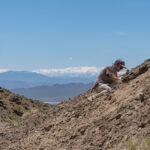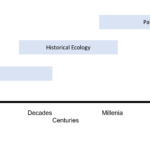paleontology
Graduate Student Sheds Light on Ancient Worms as Early Ecosystem Engineers
Sep. 10, 2024—By Andy Flick, Evolutionary Studies scientific coordinator Graduate student Kat Turk from Vanderbilt University’s Department of Earth and Environmental Sciences, along with an international team of collaborators, has uncovered new evidence that ancient priapulid worms, through their burrowing behavior, may have been some of the earliest ecosystem engineers. The study, “Priapulid neoichnology, ecosystem engineering, and...
Unveiling Evolutionary Transitions: Vanderbilt Professor Explores Triassic Mammals’ Adaptations to Changing Environments
Apr. 26, 2024—By: Sarah Ward, Evolutionary Studies Communications Assistant Vanderbilt professor Neil Kelley assisted in a study which characterized the evolutionary response of 250-million-year-old (Triassic) mammals to habitat transitions. Their work was published August 2023 in the Swiss Journal of Paleontology, and it explores how similar mammals can react differently to the same environmental challenges. Kelley finds...
Vanderbilt Graduate Student is Getting to the Bottom of Worm Burrows
Apr. 26, 2024—By: Sarah Ward, Evolutionary Studies Graduate Communications Assistant Vanderbilt graduate student Katherine Turk and colleagues found that worm burrowing behaviors could have emerged earlier in earth’s history than was previously thought. Her work Archaeichnium haughtoni: a robust burrow lining from the Ediacaran–Cambrian transition of Namibia was published this January 2024 in Papers in Paleontology, and...
Vanderbilt researchers bring paleoecology into the 21st century
Jul. 7, 2022—By Andy Flick, Evolutionary Studies scientific coordinator Science is an inherently collaborative endeavor. When a respected colleague courteously disagrees with your point of view, it can lead to great new papers, perspectives and collaborations. In that same vein, feedback from editors and reviewers of academic journals is an often-understated driver of new research directions. Assistant...



